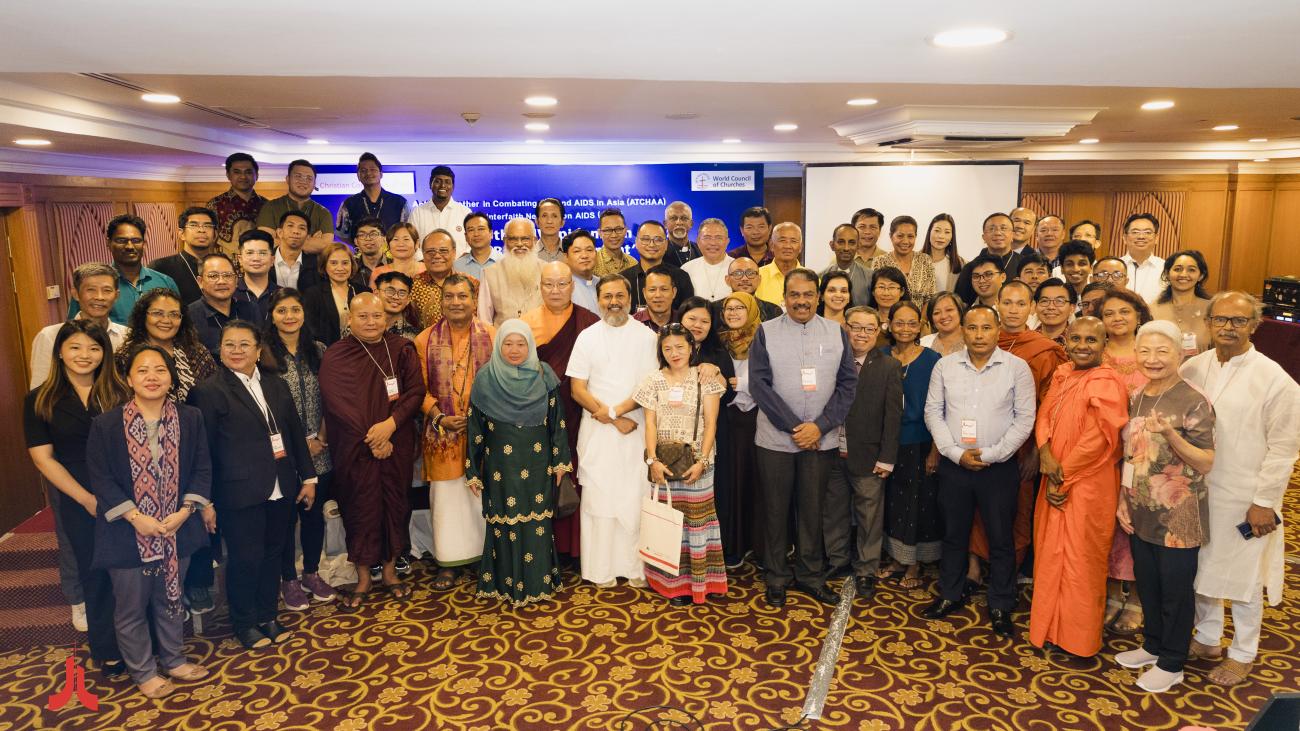CCA-WCC regional interfaith conference gathers in Cambodia to chart a path to reverse the HIV epidemic in Asia

Participants of the Regional Interfaith Conference on 'Reversing the HIV Epidemic in Asia: Faith Based Engagements'
Phnom Penh, Cambodia: The Asian interfaith conference on ‘Reversing the HIV Epidemic in Asia: Faith Based Engagements’ has commenced in Phnom Penh, Cambodia.
Over eighty representatives from different religions, networks of people living with HIV (PLHIV), NGOs working in the field of health and healing, and faith-based organisations (FBOs) are attending the conference, which is being held from 14 to 16 November 2024.
Organised by the Christian Conference of Asia’s (CCA) Action Together in Combating HIV and AIDS in Asia (ATCHAA) programme and the World Council of Churches (WCC), the conference aims to develop strategies for advocacy among people and communities to combat the spread of HIV and AIDS in the region.
Dr Mathews George Chunakara, General Secretary of CCA, opened the conference with thematic introduction, setting the tone for the three-day event.
The CCA General Secretary provided an overview of the CCA’s long-standing involvement in addressing HIV and AIDS in Asia since 1992, particularly at a time when very few faith-based organisations had taken the initiative in this area. He affirmed the CCA’s enduring commitment to taking action together in addressing issues related to HIV and AIDS.
Dr Mathews George Chunakara reminded the gathering of the crucial role faith-based organisations have played in the HIV response, harnessing their strong community connections and extensive healthcare networks.
He emphasised that HIV and AIDS remain a profound social, economic, political, and spiritual challenge, particularly among the youth. Overcoming the stigma that fuels its spread requires courage, commitment, and leadership, especially from religious leaders, who hold the trust and authority to drive transformative change.
The CCA General Secretary highlighted that when people with HIV face stigma, they often stay silent out of fear, avoiding the support that could help them lead healthier lives and the information needed to prevent further spread of the virus.
“Religious leaders are uniquely poised to break this silence by acknowledging suffering and reaching out with compassion to the excluded and rejected. They have the moral authority to end guilt, denial, stigma, and discrimination, and open the way to reconciliation and hope, knowledge and spiritual accompaniment for healing, prevention and care”, stated Dr Chunakara.
Representing their respective faith communities, Venerable Lam Ngodup from the Commission for Religious Organisations of Bhutan, Swami Atmananda from The Art of Living Foundation (India), and Dr Citra Fitri Agustina from Nahdlatul Ulama (Indonesia) extended greetings to the gathering.
Stela Sacaliuc, Knowledge Management Officer of UNAIDS Regional Team for Asia and the Pacific, led a session on “The HIV Epidemic in Asia: Most Affected Groups, Most Successful Interventions.”
Ms Sacaliuc traced the HIV response timeline, from the first documented case in the USA in 1981 to the advanced interventions of today, and provided updated statistics for the Asia-Pacific region.
She further emphasised the need to scale up innovative interventions in Asia, customise HIV services across prevention and care, and expand Pre-Exposure Prophylaxis (PrEP) programmes beyond pilot stages to national levels, highlighting progress in countries like Cambodia and Thailand.
While highlighting the unique role that faith-based communities play in the HIV response, she added, “Faith-based communities’ role through critical engagement and contributions in community leadership, providing safe and enabling environments, forming partnerships and collaborations, offering support services, encouraging self-care, delivering essential healthcare, raising awareness, and advocating for policy change are essential parameters to address the HIV and AIDS menace effectively”.
Participants engaged in lively discussions on various issues surrounding HIV and AIDS in Asia, exploring how faith-based organisations could play a pivotal role in addressing them in the region.










